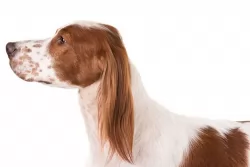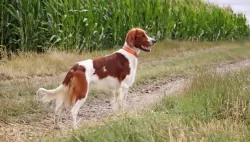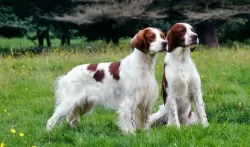 MyDogBreeds
MyDogBreeds Irish Red and White Setter is originated from Ireland but Corgi is originated from United Kingdom. Irish Red and White Setter may grow 31 cm / 13 inches higher than Corgi. Irish Red and White Setter may weigh 20 kg / 45 pounds more than Corgi. Both Irish Red and White Setter and Corgi has same life span. Both Irish Red and White Setter and Corgi has almost same litter size. Irish Red and White Setter requires Moderate maintenance. But Corgi requires Low maintenance
Irish Red and White Setter is originated from Ireland but Corgi is originated from United Kingdom. Irish Red and White Setter may grow 31 cm / 13 inches higher than Corgi. Irish Red and White Setter may weigh 20 kg / 45 pounds more than Corgi. Both Irish Red and White Setter and Corgi has same life span. Both Irish Red and White Setter and Corgi has almost same litter size. Irish Red and White Setter requires Moderate maintenance. But Corgi requires Low maintenance
 Classified as a gun dog in the UK for hunting game birds, and as a sporting dog in the USA, the Irish Red and White Setter was available with his red and white coat. Breeders however, started focusing essentially on the red variety so that the red-and-white setter all but disappeared.
Classified as a gun dog in the UK for hunting game birds, and as a sporting dog in the USA, the Irish Red and White Setter was available with his red and white coat. Breeders however, started focusing essentially on the red variety so that the red-and-white setter all but disappeared.
Fortunately, the breed was revived and considered a separate breed from the Irish Setter. He has gained recognition with all the major kennel clubs.
 Known as a cattle herding dog breed, the Corgi hails from Pembrokeshire, Wales. You get 2 breeds – the Cardigan Welsh Corgi and the Welsh Corgi.
Known as a cattle herding dog breed, the Corgi hails from Pembrokeshire, Wales. You get 2 breeds – the Cardigan Welsh Corgi and the Welsh Corgi.
The word ‘Korgi’ actually means ‘dwarf dog’. According to some, the small dog’s history goes back as far as 1107AD, but when you start doing research, you find that the Pembroke Welsh Corgi doesn’t have a traceable breed history.
The Pembrokeshire Corgi was officially recognized by the Kennel Club in the United Kingdom in 1934 and is a breed separate from the Cardiganshire Corgi.
 The Irish Red and White Setter is a large dog standing at between 56 – 61cm, both male and female, and weighing at around 25 to 34kg.
The Irish Red and White Setter is a large dog standing at between 56 – 61cm, both male and female, and weighing at around 25 to 34kg.
Always used as a gun dog for its speed and scent, its head is carried high and its long feathery tail is held out level with its back and then it ‘sets’ into a pose, giving its handler a clue where the bird is hiding.
The Irish Red and White Setter has a lean, muscled body which is well proportioned, being slightly more heavily built than the Irish Setter. He also has a broader head.
The coat is shortish but it has those long silky fringes which are known as feathering around the tail, chest and legs. The Irish Red and White Setter is red and white but you may find some freckling around the legs and muzzle. The ears are usually red and they are long, silky and floppy.
As gun dogs, the Irish Red and White Setter is a loyal and devoted family pet who can become a good friend of children too as they love to play. He is a lithe dog and bounding in energy, and he will therefore require a reasonably sized garden.
He will need to be trained and socialized and once trained he makes an obedient and reliable companion.
 The Corgi is a small to medium sized dog, standing at 25 to 30cm and weighs between 10 to 14kg.
The Corgi is a small to medium sized dog, standing at 25 to 30cm and weighs between 10 to 14kg.
The coat of the Corgi is fairly short to medium length and is thick. You’ll find him to be available in colors such as red, fawn, black and tan and with white markings.
He has a sharp, intelligent face with an amicable expression. Looking much like a fox with short legs, he has a long, low-set body body and is a sturdy dog. His ears also stand erect and he has a docked tail.
 The Irish Red and White Setter is every bit as beautiful as the Red- or Irish Setter even though he may not be as well known.
The Irish Red and White Setter is every bit as beautiful as the Red- or Irish Setter even though he may not be as well known.
Setter lovers are thrilled that this beautiful, playful, well tempered dog has been saved from extinction. He has plenty of stamina to be an excellent sporting dog.
He is intelligent too and easily trained. He is an affectionate, loyal, gentle, devoted family dog and he has also got good looks on his side.
Give him the right kind of food, a warm, dry place to sleep, lots of exercise and games and your love and attention, and you’ve got a friend for life.
 The sweet little Corgi is well known with his association with Britain’s Queen Elizabeth who has always loved these dogs with their long bodies and short legs. But while the Corgi may well be associated with royalty, he isn’t too snooty by any means to be your pet.
The sweet little Corgi is well known with his association with Britain’s Queen Elizabeth who has always loved these dogs with their long bodies and short legs. But while the Corgi may well be associated with royalty, he isn’t too snooty by any means to be your pet.
He has got a wonderful personality, and he is just waiting to be allowed into your household where he will prove to be a loving, devoted companion and friend.
 Dogs like the Setter can get chronic allergies if they’re exposed to the same food over and over again. Setters are prone to chronic allergies when exposed to a food such as soy. That is why if you’re unsure, rather speak to a dog expert about what to feed a Setter and what to avoid.
Dogs like the Setter can get chronic allergies if they’re exposed to the same food over and over again. Setters are prone to chronic allergies when exposed to a food such as soy. That is why if you’re unsure, rather speak to a dog expert about what to feed a Setter and what to avoid.
Feed your Setter foods rich in taurine to avoid heart disease. Taurine is found in chicken and red meat. You can see how important the right food is for your setter as the wrong food can cause a host of illnesses.
 A corgi, when he is well looked after, can live to be anything from 12 to 15 years of age. However even this sturdy dog may well be susceptible to some of the more common dog illnesses, such as hip dysplasia and degenerative myelopathy.
A corgi, when he is well looked after, can live to be anything from 12 to 15 years of age. However even this sturdy dog may well be susceptible to some of the more common dog illnesses, such as hip dysplasia and degenerative myelopathy.
Also you have to be careful with your Corgi and make sure that he doesn’t gain weight as this weight gain can bring with it a host of health complications.
Hip dysplasia with your Corgi is about an abnormal joint structure where the bones lose contact with each other. This parting of the bones is known as subluxation, and it is this subluxation that can cause your pet pain and discomfort and lead to osteoarthritis.
This disease isn’t reserved for old dogs either, and some young dogs can begin to show signs of this disease before they reach their first birthday. Without taking your dog to the vet and having medical intervention, your pet may eventually be unable to walk.
It is so sad when Degenerative Myelopathy invades your pet as it is a devastating disease watching your pet become paralyzed. The disease seems to come on when then dog is between 8 and 14 years of age where your pet loses co-ordination in the hind limbs, getting worse until he can no longer walk. Often your dog can no longer control his urine output.
There are no real treatments that have stopped the progression of the disease and your vet may suggest treatments that can make your pet more comfortable You vet may compassionately suggest your dog be put down, particularly for those people who can’t afford treatment.
 Grooming your beautiful Irish Red and White Setter isn’t going to be a difficult task, and a good brush twice a week will ensure he stays looking his best.
Grooming your beautiful Irish Red and White Setter isn’t going to be a difficult task, and a good brush twice a week will ensure he stays looking his best.
Because he has long ears, these should be checked, especially if the dog loves to swim. Water, dust, debris and wax can build up and cause an ear infection.
His nails will also need to be trimmed if they get too long and don’t naturally wear down.
This is a beautiful dog that offers ruggedness and endurance, and essentially he needs to be a country dog or live in a home where there is a good sized garden. He loves being on the go, and is a dog that will gladly join you on your hikes, cycling trips or swimming – you can count him in.
Irish Red and White Setters are an active breed and are naturally lean and lithe, being fast runners. Make sure to give them the right food so that they maintain this muscle mass.
If in any doubt, speak to your vet to find out what is essential for a dog like this. Protein for instance is vitally important as are fats. These dogs need high amounts of energy. Vitamins and minerals are also very important for keeping a dog healthy and strong.
Try and include some nutritious home-made food into his kibble such as cooked chicken, brown rice and vegetables as well as some raw meat occasionally. These dogs can develop horrible skin allergies if they don’t get in some raw meat from time to time.
Fresh, cool water should be constantly available to your pet.
 The Corgi isn’t a particularly heavy shedder, so a brush down twice a week will be excellent for his thick coat. And of coarse he will thrive on the attention given to him during the brushing session.
The Corgi isn’t a particularly heavy shedder, so a brush down twice a week will be excellent for his thick coat. And of coarse he will thrive on the attention given to him during the brushing session.
Corgis love walks and sniffing around as they go along. They’re energetic dogs so you’ll need to include him in your daily walks which he just loves, and include him in some ball games.
Corgis may be short in stature but they are robust dogs – sturdily built. They are active dogs and can use up a lot of calories. They will certainly require a diet that features good quality protein.
Feed your Corgi a good quality food designed for special life stages – puppy, adult, pregnant female, senior dog and also dogs with illnesses.
Most Corgis do well having 2 meals of kibble a day. Puppies usually eat 4 meals a day until they are old enough to move onto an adult feeding schedule. Include cooked rice, meat and vegetables in his diet as well as raw meat from time to time and ensure there is always a bowl of clean, cool water available.